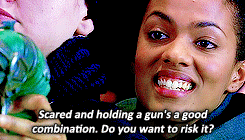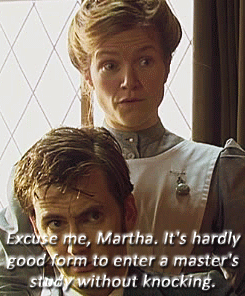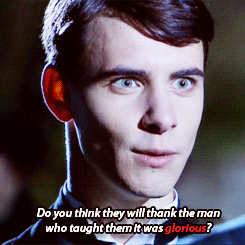Series 3, Story 8 (Overall Series Story #189a) | Previous - Next | Index
 |
| Image via Does it need saying? |
It wasn't that long ago that we'd sat through the "Daleks in Manhattan" / "Evolution of the Daleks" followed by "The Lazarus Experiment". Things were looking pretty dire. "42" splits opinion, but went a long way towards righting the ship. Ten's shabby treatment of Martha Unrequited was working our collective last nerve, her sourpuss mum was unsympathetic, and the season arc was clearly trending towards more revelations about this Saxon character and the machinations of his minions around the Jones family -- an unpromising trend given how unsympathetic and unlikable those characters are, on the whole.
Then, along comes "Human Nature" and, oh boy, now we're really getting somewhere. This is the series in its prime: villains by whom the Doctor is truly imperiled, a brilliant ensemble working together in a compelling story, and one that is putting pieces in place for the larger arc in a manner without detracting from current story being told. So, when "Utopia" come along later, we are rewarded for having loved this one so much, instead of having it be cheapened by later events or shoe-horned into a ta-da montage of loose-ends tied up for convenience's sake.
Nearly everything about this story works. It's structure, the way it opens in what is revealed to be John Smith's dream of the Doctor, but that dream is later picked up as Martha's memory when she has come back to the TARDIS to fend off despair over their situation, is the kind of skillful television storytelling that we expect high-toned drama. Here it is executed in mere genre TV in a way that demolishes the categories. When it wants to be, when it really tries, Doctor Who can be every bit as satisfying as the best TV has to offer.
Now, I've not read Paul Cornell's Human Nature, the novel (of the fanfic) that this was adapted from, but clearly this story benefited from its source material. The Virgin novels are a path I never went down -- I'm a bit of loyalist in the sense preferring the Target novelizations and thinking of everything outside the stories on TV as non-canonical, but perfectly valid as source material to be mined for TV. Case in point, Seven was the Doctor in the novel, so this adaptation had to make sweeping changes. But, the richness of a fully imagined setting, populated with characters having their own internal lives, and the outline of a story that is dramatically sound were a wealth of assets for this adaptation to draw on.
The success of this story and of "Blink," based on a short story, which follows, would seem to be strong arguments for mining the non-canonical material for its best ideas and stories and turning them into stories for the contemporary Doctor.
Freema Agyeman deserves a great deal of credit for her portrayal of Martha here. Martha's unrequited love of the Doctor is a pain point for me when it comes to this season, but Ms. Agyeman does as well as anyone possibly could with what she was given. She is restrained when she needs to be, no telegraphed expressions or movements when John Smith talks about his dream, Martha is fully in the role she was given by the Doctor; Ms. Agyeman is fully in the role of Martha. The worst line in the story is "and it wasn't me," it's just too on the nose, too maudlin. But, it's how her character was written and it's Ms. Agyeman's reading that prevented it from making Martha's character seem to weak and Doctor-centric.
We know that later, Martha's got a long road ahead of her, traversing the Earth after The Master captures the Doctor and unleashes the Toclafane. Her actions here, at the dance especially, when she fulfills the action hero role while John Smith whinges, show she's made of sterner stuff, and can handle the greater challenges in store for her.
 |
| Image via rebloggy |
But the scene above is great because it actually bucks that very trend [of rewriting history with modern liberal assumptions]. ...[I]n 'Human Nature' / 'Family of Blood' the issues of racism and sexism are not just totally effaced so that we can all get on with having fun. Joan is a Nice-But-Then character in many ways, but she's also allowed to evince sexist, 'classist' (not a term I'm fond of, but it'll do for now) and racist attitudes. And this isn't just done so that we self-satisfied modern liberals can feel superior to all those backward numpties in the past. Joan's attitudes are shown to be contested within the same period by other contemporary characters, most especially Martha's friend and fellow-maid Jenny ...
Best of all is the fact that Martha answers back angrily, displaying her annoyance unashamedly and eloquently making mincemeat of Joan's thoughtless assumptions. Okay, Martha could be seen as accepting the onus of having to 'prove herself' to the white woman, which would be problematic... but that isn't how Agyeman and Hynes play it. Their version of the scene is more like Joan getting a deserved ritual humiliation ...
The scene depicts intersectional prejudice, and from an otherwise deeply sympathetic character, thus nixing the simplistic idea (surprisingly prevalent today, in the wake of partial and piecemeal social changes) that racism and sexism are Big Bad Bogeys that only Bad People do. It tacitly recognises intersectionality, along with prejudice as structural and socially constructed - something surprisingly rare in pop-culture. And it also depicts the only way prejudices ever get addressed: by those on the sharp end - the women, people of colour, the 'skivvies' - getting seriously pissed off and talking back.Depictions of racial tension in drama is high wire act requiring delicate balance, Redfern and John Smith have to be of the times but not unlikable. Here's where I think a rant about how being radical doesn't mean your wrong comes in. We make apologies for the 'good guys' in history having terrible ideas about gender politics, class, and race because it's easier than holding people accountable for not being brave enough to challenge wrongs. As if *nobody* could see that bullying someone because you have a superior position in society over them is just plain wrong. That's never the case -- even when it's only the folks taking the abuse who recognize it, as if that's ever been the case. In terms of the drama, Baines and his Hutchinson are free to engage in ugly racial bullying because they're understood to be twats, and we don't need to like them, but it would be far too easy for the writer to give the heroes contemporary liberal values so we wouldn't have to worry about any of the audience not liking them.
If we need to find something clunky, let's roll our eyes at the Doctor tossing a cricket ball to save a baby from a falling piano. He makes a toss that sets off series of events only Rube Goldberg could love, ending with the stroller coming up short of the crash. Would it not have made more sense to simply hit the wheel of the stroller to stop it, while shouting?
The Family of Blood - Wikipedia, the free encyclopedia
Series 3, Story 9 (Overall Series Story #189b) | Previous - Next | Index
 |
| Image via Coffee and Wizards |
ROCASTLE: You speak with someone else's voice, Baines. Who might that be?When I grade these stories out, "The Family of Blood" comes in a notch lower because I'm a little uncomfortable with the Doctor donning the red poppy for Remembrance Day. It's not that I feel it's inappropriate to honor the sacrifice of those who died in WWI, it's that it strikes me as the same easy sentimentality American cultural indulges in for Memorial Day -- which is a tacit conceit that war is ever honorable or glorious in some way -- and that chills my blood. We honor the sacrifice, but never hold anyone accountable for what a fucking hash they've made of the world by treating other human beings as inferiors who deserve to be exploited, their land and resources naturally belonging to the colonial power great enough to seize them.
BAINES: We are the Family of Blood.
ROCASTLE: Mister Smith said there had been deaths.
BAINES: Yes, sir. And they were good, sir.
ROCASTLE: Well, I warn you, the school is armed.
BAINES: All your little tin soldiers. But tell me, sir, will they thank you?
ROCASTLE: I don't understand.
BAINES: What do you know of history, sir? What do you know of next year?
ROCASTLE: You're not making sense, Baines.
BAINES: 1914, sir. Because the Family has travelled far and wide looking for Mister Smith and, oh, the things we have seen. War is coming. In foreign fields, war of the whole wide world, with all your boys falling down in the mud. Do you think they will thank the man who taught them it was glorious?
ROCASTLE: Don't you forget, boy, I've been a soldier. I was in South Africa. I used my dead mates for sandbags. I fought with the butt of my rifle when the bullets ran out, and I would go back there tomorrow for King and Country!
BAINES: Et cetera, et cetera.*
Why, Head Master, why would you go back to South Africa? What were your King and Country asking you to do there? I assume we're talking about the Boer War (or the 'Second Anglo-Boer War,' I guess, depending on who you ask how they're named). That was a war fought, as I understand it, by colonial powers over the control of the region we now now as South Africa's, wealth. So, Head Master, if King and Country asked you to go spill more blood to acquire another gold mine in foreign soil, you would? Of course you would, and as an old man you would ask younger men to go and do it for you. This is the sickening truth of war that is glossed over with tales of heroism and sacrifice, and celebrated with waving flags and solemnized with red poppies.
There's also the aspect of the Doctor that decides to punish the Family by making them immortal, imprisoning them in ways that force them to suffer forever, but also the idea that he goes back every year (whatever that means to a time traveler and eternals) to visit at least one of them. The Family were going to die shortly anyways, which I understand could be seen as not allowing them enough time to pay for what they did, but one imagines there's a way they could have been made to pay for their evil, while also being allowed to die at some point. The Doctor's excessive punishment here looks an awful lot like him taking the punishment that should have been for him -- the punishment he earned by deciding to hide among humans knowing the Family would come looking for him, effectively using the schoolboys, the staff, and the townspeople as human shields -- and doling it multiplied for them to suffer on his behalf. Far from making this Doctor seem like a righteous avenger, it makes him seem like dangerous menace. From this view, a case could be made that he's every bit as much the villain of the piece as the Family.
However, it's asking an awful lot of Doctor Who to expect it to be radically pacifist, righteously socialist, unabashedly secular and atheist, feminist, in short, to embody all the values humanity will ultimately have to embrace to survive as a species while remaining a viable commercial enterprise in a neo-liberal world. Just as we acknowledge Joan Redfern's character flaws without discounting her humanity, we take Doctor Who for what it is and appreciate where the Platonic form shines through, and try to account for the refraction caused by the imperfections in our real world execution of the marketplace of ideas.
* Transcript via The Doctor Who Transcripts